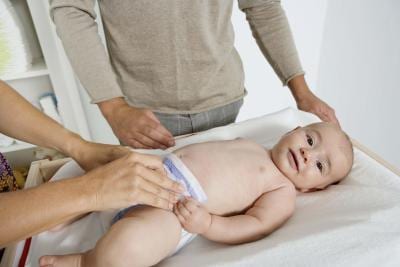Diarrhea in babies may be a result of many things — a viral or bacterial infection, food poisoning, food intolerance or ingesting a poisonous substance. Check with your doctor first, but in most cases, you can treat the problem at home by modifying the food that your baby eats. Little tummies need gentle food to get them back to normal.
Breast and Formula Fed Babies
If your baby is still only eating breast milk or formula, you shouldn’t deviate from this plan, though you may need to feed more frequently to prevent dehydration. Formula feeders may want to switch to soy-based formulas until baby’s diarrhea clears up. Breastfeeding mothers should pay attention to their diets as well. Occasionally, you may notice a pattern to your baby’s diarrhea — certain foods that you eat may trigger it.
BRAT Diet
Those babies who have started eating solids can follow a BRAT diet to put an end to diarrhea. This consists of bananas, plain rice, applesauce and plain toast. These foods are simple and easy on the digestive system.
Other Foods
Some doctors, including Dr. Alan Greene, don’t believe that you need to strictly limit your child’s diet. Other foods, such as a broth-based soup, saltine crackers, potatoes or yogurt can also ease your child’s stomach. You can experiment to see how she responds to different types of food. Children who are lactose-intolerant should be given only soy-based yogurt.
Foods to Avoid
Certain foods are likely culprits when it comes to diarrhea. Fruit juice is one of the most common offenders. You may also want to avoid whole fruits like plums, peaches or grapes. Foods that contain a lot of fat, like fried foods or junk foods, are also more likely to cause diarrhea.
Dehydration
The biggest concern with a baby who has diarrhea is that he’ll become dehydrated. Talk to your doctor about how you can handle this. Offer your child plenty of water, but avoid milk and fruit juice. Your doctor may suggest using an oral rehydration solution, which you can purchase in most stores. If your child is also vomiting and cannot keep any liquids down, he may need hydration therapy through intravenous, or IV fluids.





